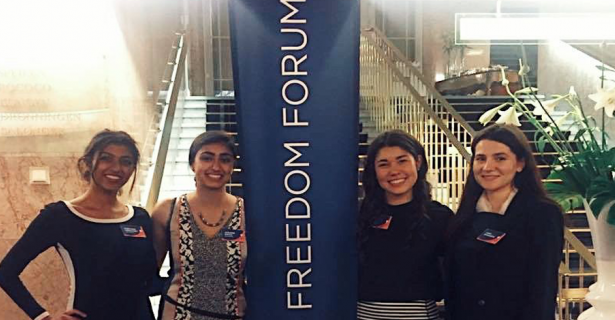“As Salam Alaykom” I greeted my mentor, Dr. Nada Dhaif, excitedly over a skype call in early May. We chatted briefly about the expectations and responsibilities interning remotely for BRAVO (Bahrain Rehabilitation and Anti-Violence Organization). She ended the phone call asking if I would be attending the Oslo Freedom Forum, and enthusiastically I told her yes. As a previous speaker of the forum she told me that she was so glad to hear that because attending the Oslo Freedom Forum is truly an experience of a lifetime. She then proceeded telling me how she and her husband were going to try to make it, however, due to the travel restrictions in Bahrain, there was a possibility that they might be denied to travel to Norway.
I arrived to Oslo with a kick in my step ready to chat with other forum attendees, learn from speakers, connect with the other Oslo scholars and meet Dr. Dhaif. However, I quickly learned from the staff at HRF that the travel restrictions in Bahrain were enforced and that Dr. Dhaif would not be able to make it. While I was disappointed, I knew that she wasn’t the only person who has faced opposition in attending the human rights conference. Over 10 previous speakers of the forum have been banned from further attending OFF by their government.
While I didn’t have the chance to meet Dr. Dhaif in person, her bravery, courage, optimism, and kindness truly shines through. During the Arab Spring of 2011, Dr. Dhaif helped set up a medical tent at the Pearl Roundabout and was abducted from her house in the middle of the night a few weeks later. She was the first woman to be detained and tortured during the Arab Spring, with the “crime” of medically treating pro-democracy protesters. She was released two months later and after taking a year off abroad in recovery, she came back to Bahrain and founded BRAVO. As co-founder and director, Dr. Dhaif is at the front lines not only speaking out against torture practices in Bahrain, but also leading rehabilitation programs for survivors and their families.
The work Dr. Dhaif does is not easy or even safe. Last year she announced that due to the severity of the situation in Bahrain and the strength of the regime, that she might have to stop doing her work with BRAVO, as the danger is for herself and her family is too great. Torture is highly stigmatized in Bahrain, especially for those who have been detained and tortured. They are afraid to seek help and are outcasted and discriminated against in society. However, despite these challenges, Dr. Dhaif remains positive that healing and rehabilitation is possible. One of the main goals for BRAVO is to create more awareness about the prevalence of torture, the effects it can have on survivors and their families, and ways they can be rehabilitated reintegrated into society.
And to support this mission, my first assignment is to create a downloadable PDF guide about understanding the effects of torture. The guide will expand upon specific physical and psychological methods of torture including electrocution, handcuff neuropathy, cold cell torture, sexual assault, sleep deprivation, falaka (foot sole beatings), solitary confinement, mock executions, family threats and verbal abuse. The guide will be translated into Arabic and be distributed to lawyers, social workers, families of survivors and even survivors themselves. While researching torture methods and the physical and psychological consequences is emotionally difficult and challenging, I know that this work is extremely important, not only for human rights advocates or torture survivors themselves, but also the future of Bahrain. As Dr. Dhaif says, “Power comes from within, and the first step to help individuals and communities heal and recover is awareness. Awareness that torture is occurring in their society and awareness that life after torture is possible.”

